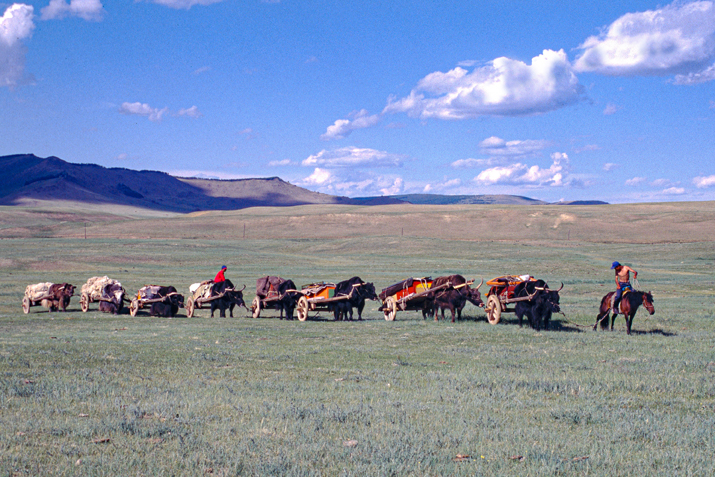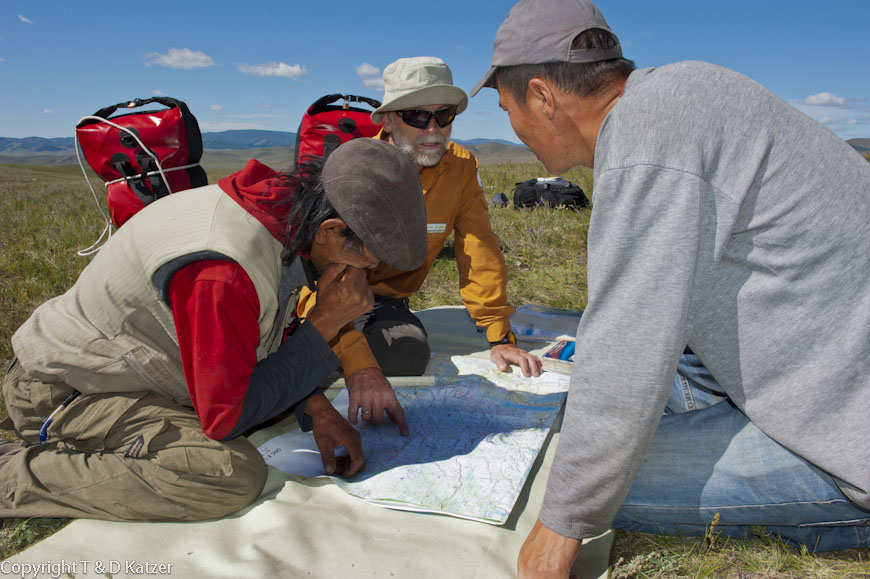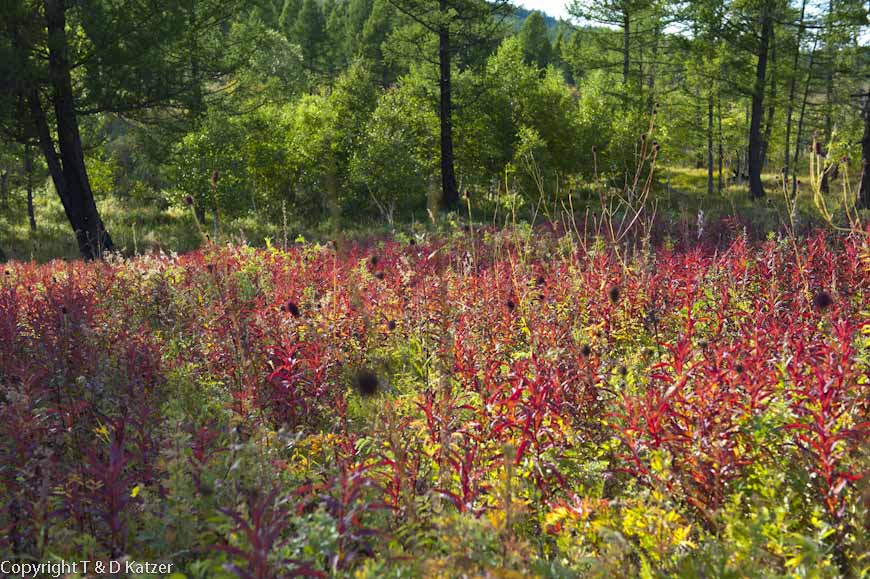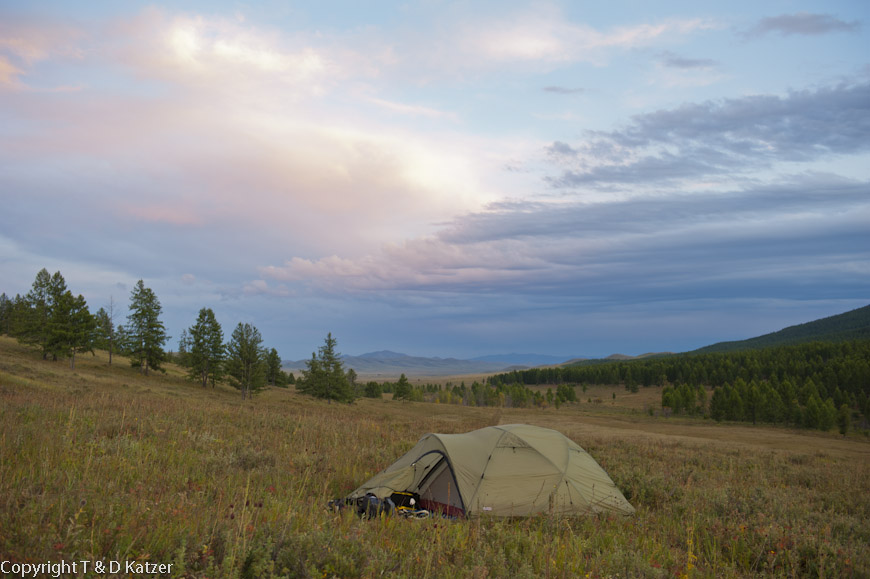
Mogi is happy about his new freedom
N 48°59'053'' E 103°28'751''
Day: 40
Sunrise:
06:23 a.m.
Sunset:
7:48 pm
As the crow flies:
13,22
Daily kilometers:
19
Total kilometers:
480
Soil condition:
Meadow
Temperature – Day (maximum):
24 °C
Temperature – day (minimum):
24 °C
Temperature – Night:
minus 5 °C
Latitude:
48°59’053”
Longitude:
103°28’751”
Maximum height:
1488 m above sea level
Time of departure:
2:00 pm
Arrival time:
6:00 pm





The first night watch in the tent was very pleasant compared to the last. We didn’t freeze and ultimately had the same success. I can even use the time to record my short notes of the day’s events and camp coordinates, the distance traveled during the day and everything that goes with it. We get up at 8:30 a.m. in beautiful sunshine. We want to try to leave earlier today because if we continue to cover such short distances we will never make it to this year’s stage finish. Bilgee and Ulzii go to water the horses at a stream and fetch water. “We need a different routine. It doesn’t work like this. Next time, the two of them have to have breakfast first and then fetch water. Otherwise I won’t be able to pack up my kitchen and we’ll be leaving so late again,” says Tanja. I decide to call a short briefing when Bilgee and Ulzii are back. In future, we would have to fetch and pump water in the evening. You will take care of that Ulzii. Tanja does the cooking, I take care of the navigation, records and loading the horse-drawn carriage. “Bilgee and Ulzii, you take care of the horses. It’s best to water them in the evening. In a few days we’ll have developed a routine and everything will be easier. We will then be able to set off earlier and, above all, get to camp earlier. It would be ideal to find the camp site by 16:00 at the latest. Then we’ll have enough time to prepare everything before the cold night,” I tell Ulzii. As his English is limited to a few words at times due to his tiredness and he always has the habit of claiming to understand everything even though he sometimes understands absolutely nothing, we have a considerable challenge here. During past expeditions we realized how important a good translator is and how dangerous it can be if statements and conversations are misinterpreted. Especially when two completely different cultures are involved. Misunderstandings quickly build up which are sometimes irreparable, especially when the translator brings his or her personal interpretation into play and begins to influence the process. This is the reason why we try to carry out our expeditions without strangers, or rather, paid guides. Without personnel, there are no misunderstandings in the team and the success of the expedition is many times higher. However, this Mongolia expedition is hardly possible without a companion. We would have loved to have someone with better English skills with us, but unfortunately we couldn’t find anyone else in the short time available. Now Ulzii is a team member who is not exactly overflowing with diligence, is rather unsuitable as a translator but has so far proved to be a nice person. Above all, he doesn’t drink alcohol and is therefore hopefully reliable. We will see how his personality reveals itself over time and with the challenges that lie ahead. So far, Bilgee has also been very friendly, reliable and honest. If the two of them stay the way they are at the moment, Tanja and I don’t see any unpleasant surprises coming our way.
Before we set off, Bilgee’s relatives turn up in a jeep. There is a joyful palaver. Then they all help together to harness the reluctant Sharga. Nevertheless, we don’t manage to set off again until 14:00. “Think about our Australian expedition. In the first few weeks, it took us much longer to load the camels and we only managed a maximum of ten kilometers a day. Later, when we got into the routine, it was no longer a problem. We made good progress,” says Tanja, dispelling any doubts I had about reaching our goal before winter. Lost in thought, I sit on Sar’s back for the first few kilometers and wonder where we can keep our horses in winter. Apparently the animals cannot survive in the Zaatan. Only reindeer can supposedly cope with these harsh conditions. There is supposed to be a lot of snow where the Zaatans live and everyone we meet says that it gets extremely cold there. “Getting to the Zaatan by horse and cart is absolutely impossible. There’s one high mountain after another,” says Bilgee. So it is still uncertain how we will even reach this region at the end of October and beginning of November. As before, we just have to let ourselves drift and not think too much about things that have nothing to do with my current reality. You’ll find something. If you can live by the statement “Everything that happens is right”, nothing can really upset you. That’s exactly what I try to incorporate into my life.
Bilgee complies with my wish to avoid or bypass every asphalt road as far as possible and leaves the road. This morning at the briefing we studied the map and decided to take a wide detour around the long 1,600-meter-high mountain range ahead of us. We ride through a valley whose beauty is once again hard to describe. Without a doubt, Mongolia is one of the most impressive countries I have ever seen in my entire travel life, due to the abundance of its scenic beauty and uniqueness. “Shall we dare to let Mogi off the leash?” I ask Tanja. “Do you think he’s gotten used to us enough that he won’t run away?” “I think so. Let’s give it a try,” I say, which is why we let him off the leash. Mogi enjoys his sudden freedom to the full. He races back and forth, leaping up into the air like a goat, only to chase across the prairie like the wind a split second later, trying to catch himself. As there is at least one dog at each yurt, we tie it to the cord again near the nomadic dwellings and lead it behind us, sitting on the horse. That way we avoid the terrible dog fights he would undoubtedly get into. “Look at that. He’s following the horse-drawn cart very well. He’s obviously accepted it as his home,” says Tanja, laughing and enjoying the fun four-legged friend.
Slowly, the wide valley narrows more and more and with every meter you climb higher. Yurts have not been around for some time. Because there doesn’t seem to be any water here, we have to move on. “There is only water on the other side of the pass,” says the experienced hunter Bilgee. Although we are tired and urgently need a camp because of the coming night, we cannot afford to camp here. Our horses urgently need water every day. But we also carry just enough water for one day. “We’ll change that from now on. We need more water supplies in future,” I decide. Ulzii rides ahead as a scout to see if there is a spring on the mountain top. A little later, Bilgee discovers a few puddles not far from the path. “The water comes straight from the mountain,” he says happily, adding that it is of good quality. We decide to set up camp on the nearby mountainside. There is hardly a straight spot for our tents, but the horse feed is perfect here. Ulzii has also returned in the meantime. “I was waiting for you up there. There’s water there, but that’s all over now,” he says and helps to unsaddle the horses.
Because of the mountains around us, the sun hides behind one of the hills earlier than usual. It immediately becomes very cold. While we set up the tents and settle in for the night, Tanja cooks pasta with broth for us all. She gives the men dried meat from our goat. Afterwards, she serves us hot tea and cookies. Mogi gets some of our noodles and an extra portion of rice. “In future, we’ll need more meat for the dog. He’s not a vegetarian. Maybe Bilgee can hunt something,” I tell him appealingly. “Absolutely,” he replies, laughing and rubbing his full belly with satisfaction.
We look forward to your comments!

